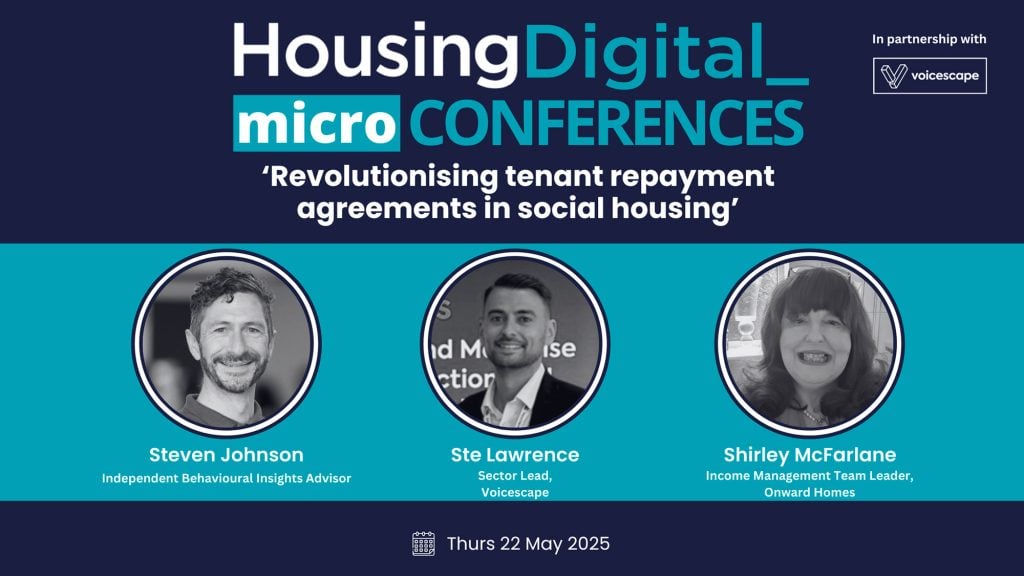
Voicescape was proud to co-host Housing Digital’s Micro-Conference series. On 22nd May 2025, we brought together a panel of sector-leading experts to drill down into tenant repayment agreements – one of social housing’s most pressing challenges for landlords, which all too often leads to mounting arrears and substantial unrecovered debt.
In this webinar, we heard from:
- Ste Lawrence, Sector Lead at Voicescape – dissecting the problem and presenting the solution
- Steven Johnson, Independent Behavioural Insights Advisor – unlocking the behavioural science behind our technology
- Shirley McFarlane, Customer Accounts Manager at Onward Homes – sharing the first customer insights and real-world applications of our breakthrough solution in predictive income analytics, Agreements Manager, as one of the trailblazing organisations who helped to craft it in its infancy
Click on the links above to jump to key insights from each speaker. Alternatively, jump to the final section on how to apply these strategies with our risk-based predictive income management solution here.
Together, they dissect the problem around tenant repayment agreements at its root, before sharing practical strategies, proven interventions, and best practices aimed at helping housing providers transform their approach.
‘Revolutionising Tenant Repayment Agreements in Social Housing’ is available for playback now. Don’t have time to watch? Here are our key takeaways.
The problem with agreements, and our solution – with Ste Lawrence
Every product Voicescape brings to market is backed by an insights project. Over the last five years, we’ve worked with over 30 organisations to gain a true picture of how repayment agreements are made, managed and monitored. Here’s what we found:
- 25-50% of a landlord’s total arrears are tied up in repayment agreements
- The average duration of these agreements is 2.4 years
- The average range of each agreement amount is £500-700
- The average repayment instalment value is <£10/week
In theory, repayment agreements are a powerful tool to secure arrears and maintain tenancies, but our research showed us that the current way of making, breaking and chasing them is highly ineffective – and actually causes more work. It also limits revenue potential (increasing FTAs) and leads to a normalised problem of drifting debt, where agreements get left to deteriorate once they are created.
Current systems can’t manage agreements effectively and they’re not agile enough to monitor variability, leading to inaccurate data. With no uniform approach or dedicated solution to management, changing tenant circumstances aren’t taken into consideration, generating more business risk – and it shows:
- Typical break rate before completion is 90+%
- Average duration of an agreement before it breaks is 3-6 months
We’re acutely in tune with the sector, and we hear that the use of repayment agreements is only set to increase with the cost of living, Universal Credit migration and, more recently, the legislative change to Third Party Deductions recovery. Now is the time to grab hold of this complex and critical challenge, and Voicescape is helping social housing organisations do just that.
Enter: Agreements Manager – our purpose-built solution that hyper-focuses on repayment agreements and works with you, not against you.
- Enhanced visibility allows you to see all agreements in one place with clarity and granular detail. Risk ratings and automatic identification help prioritise and track, in real time, agreements that are drifting, broken, require review, and more.
- The solution will recommend agreement instalments – low, optimal and high amounts – to facilitate a conversation and mutually agreed approach to increase the sustainability of agreements.
- Management and monitoring of complex, erratic customer payment patterns is made easy.
- Engagement is automated with nudges, reminders and positive reinforcement messages at key times to keep customers on track.
- Clear management information allows for strategic planning, forecasting and risk management.
With Agreements Manager, you can support tenants earlier and avoid the costs of escalations, evictions and statutory court-mandated agreements. More generally, it will help you recover more arrears, more quickly, and with less effort – driving a far better tenant-officer experience. Discover the problem and solution in greater detail in Ste’s 20-minute segment from the webinar.
Behavioural science-backed - with Steven Johnson
Evidence-based practice is at the core of every solution in the Voicescape product suite. We applied this to Agreements Manager through the statistical analysis of rent accounts and qualitative officer research of more than 30 landlords over five years. An evidence review was then conducted using behavioural science insights along with an analysis of 50+ income management policies to understand where repayment agreements featured within those documents.
We saw the huge potential that repayment agreements have as an arrears-collection tool. Well-managed agreements create control for customers, protecting psychological wellbeing and reducing stigma. They also give officers and teams an alternative to chasing people for money they might not have and raising escalations – approaching conversations with a solution focus, rather than a problem focus, to build trust. And finally, they can provide the business with risk and reputational benefits.
However, we also found that, when mismanaged, repayment agreements become a key part of the problem – with high break rates creating pressure and work for teams. From a behavioural science point of view, this cyclical making and breaking of agreements can create a normalisation of arrears and non-payment, both within the business and among tenants.
Key internal challenges include:
- Not-fit-for-purpose housing management systems (HMSs), leading teams to find manual workarounds or even stop using the HMS to manage agreements
- The right data isn’t available to support key conversations and decisions, even down to basic numerical information of a tenant’s previous agreements
- It’s often impossible to negotiate agreement amounts that are both affordable and sustainable while having a positive impact on debt
In the words of a team member taken from our research, “There is just too much life happening out there for our demographic of customers.” This makes it all the more important to introduce tools that help us optimise the factors that are controllable – creating and managing repayment agreements with the right conditionalities and cadence to be sustainable and impactful.
During our research process, we identified the following best practice framework – backed by behavioural science – to reduce the likelihood that an agreement is broken. Here it is at a top level:
- Collaboration – Co-create with tenants to build commitment through shared ownership
- Conditionality – Introduce an element of ‘eligibility’ into the conversation to reaffirm importance and gain commitment
- Cadence – Optimise the frequency, number and value of payments to create an agreement that’s both achievable and impactful
- Commitment – Incorporate subtle commitment devices to set the agreement up for success, and create ongoing ‘nudge’ opportunities to reinforce adherence
- Consequences – Ensure a timely response to avoid the positive reinforcement of non-payment behaviours, and positively reinforce payment behaviours to build new habits
- Competition – Timely and persuasive intervention is essential to ensure that tenants prioritise their rent debt to protect the security of their home
- Communication – Maintain engagement through interpersonal communication when establishing the agreement and ongoing communication throughout
When approached systematically, the repayment agreement process presents a range of key opportunities to strengthen commitment and increase the likelihood that the customer will succeed. Agreements Manager uses behavioural science principles to reinforce commitment and reduce the likelihood of default at all key touchpoints by:
- Providing data, insights and recommendations to support customer conversations
- Issuing automated outbound communications, optimised with behaviourally informed messages
Go deeper into the science, actionable insights and best practices presented by Steven in his 30-minute segment from the webinar.
Agreements Manager in action at Onward Homes – with Shirley McFarlane
Onward Homes is a social landlord with around 37,000 mixed-tenure homes across the North West. They have a particular focus on customer care and tenancy sustainability, with a recently created specialist team providing dedicated support for customers around the challenging economic climate. Even so, 30% of their overall debt is tied up in agreements or court orders. Meanwhile 35% of their repayment agreements made in the last six months won’t complete before 2027, if they don’t break beforehand…
Their challenge
- Agreements are managed in their HMS, but reporting and visibility can be complex and inaccurate
- The majority start to fail after seven or eight months – some will take more than 30 years to clear
- Chasing customers and re-administering agreements is time-consuming
- They’d like to do a full income and expenditure analysis with customers, but capacity holds them back, so arbitrary or DWP-led figures are used
- Lazy assumptions can be made about customer financial capability, meaning some repayment amounts are set too high or too low
- They understand seasonal pressures when it comes to making repayments, but don’t possess the flexibility to act on it
Onward wanted to do more to support customers out of debt and work with them through these pressures. In an attempt to improve their approach, they introduced an Open Banking Affordability Passport. This allowed their customer service team to make repayment agreements; used their analytics software for reporting, tracking and data cleansing; delivered regular phone coaching to the team; and looked at a fees model. But it brought limited success or clarity.
The solution
Already leveraging our Caseload Manager solution, Onward Homes expanded their relationship with Voicescape. They supported the development of Agreements Manager – incorporating behavioural science into how they set and manage repayment agreements to think and act differently around customer engagement
This instantly helped them see what debt was tied up in agreements, target-setting and forecasting quickly became more accurate. It also brought more consistency to the process for teams and tenants, helping them either resolve agreements quickly or provide flexibility where needed. In turn, this has helped create better experiences for both parties.
In these early days of implementation, the dedicated team of six or seven assigned to use the solution have been able to:
- Suggest tailored repayment amounts with options
- Easily understand how long agreements will take to clear based on repayment rate, which can be relayed to the customer to bring them into the process
- Incorporate data from Caseload Manager to better understand and support the customer journey
- See why previous arrangements failed, helping recreate ones that are specific to a tenant, and achievable and compatible with their income
Here’s what Onward Homes’ team said:
“I am really impressed with Agreements Manager, it's easy to use and all of the information is displayed clearly. It makes the different agreement options easy to understand for both us and the customer. I think this will have a real impact on maintaining successful agreements and maximising our collections.”
“I really like that, when making an agreement, it tells us how long it will take for the debt to be cleared. Saves us working it out and it means we can advise the customer when they ask.”
“Agreements Manager is a great way to see how well a customer's payment pattern compares to the agreement we have in place. It's also useful to have information about adherence to previous arrangements which can help inform decisions on how to proceed with a case.”
As for the future, Onward will continue to work closely with Voicescape’s Customer Success specialists to tailor the solution to their needs. For example, they’re about to go live with automated text messages to maintain ongoing communication and engagement with customers throughout their repayment agreements. Watch Shirley's segment here.
Take the next step towards risk-based predictive income management
For a deeper dive into the critical topics discussed in this webinar, download our whitepaper report, ‘We Need To Talk About Agreements’.
To learn more about Agreements Manager, visit the dedicated page on our website. And for more information on how Voicescape can help your particular organisation, chat to our friendly team to discuss your unique needs.


-2.png)


